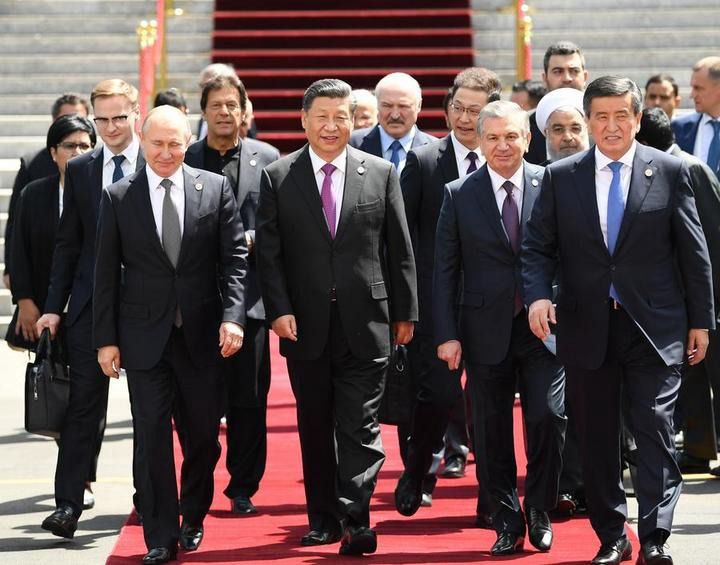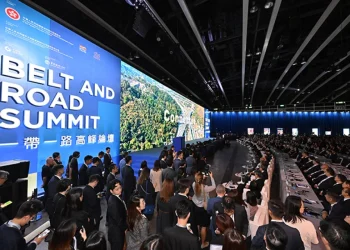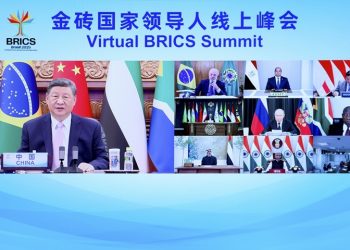BEIJING/ASTANA: On June 15, 2001, then heads of state of China, Kazakhstan, Kyrgyzstan, Russia, Tajikistan and Uzbekistan gathered in Shanghai. Together, they announced the creation of a new regional group on the Eurasian continent — the Shanghai Cooperation Organization (SCO).
The SCO is the only inter-governmental organization named after a Chinese city. It has become a key venue for China to bolster its cooperation with countries in Central Asia and the broader Eurasian landmass.
Over the past decade, Chinese President Xi Jinping has attended every SCO head-of-state summit, including through video conferences during the COVID period. He shared at this multilateral platform his thoughts and proposals with other world leaders on ensuring regional stability, achieving more robust common development and contributing to a better world.
“A just cause finds great support, and a journey with many companions gets far.” In Xi’s eyes, the development of the SCO, which represents about half of the world’s population and a quarter of the global economy, accords with the trend of the times and goes along with the direction of human progress.
“The ‘Three evil forces,’ drug trafficking and transnational organized crime are serious threats to regional security and stability.” When Xi first addressed the SCO summit in Kyrgyzstan capital Bishkek in 2013, he opened his speech with a clear and concise assessment of the security situation facing SCO members.
The SCO was born primarily for security reasons. Its predecessor, the “Shanghai Five,” was formed to manage border security issues after the end of the Cold War. Terrorism, separatism and extremism, known as the “three evil forces,” have for decades hung over Central Asia, becoming increasingly acute following the collapse of the Soviet Union, the U.S. invasion of Afghanistan and the so-called Arab Spring.
As Xi debuted on the SCO stage, the region was facing a much more complicated security situation. The rise of the Islamic State in Iraq and Syria caused a spillover of terrorist and extremist elements into Central Asia back then, resulting in more pressure for China and its SCO partners to forge strong security ties.
The Chinese leader stressed security cooperation at every summit and mentioned “security” more than 120 times in his 11 SCO speeches. For the Chinese leader, security is the bedrock of development, while stability is a prerequisite for prosperity.
“With peace, a country enjoys prosperity, just as with rain, the land can flourish.” Xi once quoted this Uzbekistan proverb to explain his understanding of the relationship between security and development when attending the 2022 SCO Samarkand summit.
Xi pledged “zero tolerance” towards the “three evil forces” and underscored concerted efforts to eradicate them. He also urged the SCO members to help Afghanistan regain peace and push forward cooperation in tackling drug trafficking, organized crime, and nontraditional security sectors like cyberspace and outer space.
With the consistent push by Xi and his fellow SCO leaders, the SCO has, over the years, organized joint drills and cracked down on drug smuggling to cut terrorism financing. Those efforts have paid off. From 2013 to 2017, SCO member states foiled more than 600 terrorist crimes, captured some 2,000 terrorists and destroyed over 500 terrorist boot camps. Security mechanisms have improved, and joint drills have extended to cyberspace.
The SCO has also been a platform on which Xi expounded his new security vision for Asia — a common, comprehensive, cooperative and sustainable security.
The world today remains gripped by war and conflict. Xi has always been concerned with preventing war and achieving lasting peace. In 2022, he proposed the Global Security Initiative (GSI), a global public good provided by China to advance global security governance.
The guiding principle of the GSI is consistent with his security vision, offering China’s solution to the question of the times.








